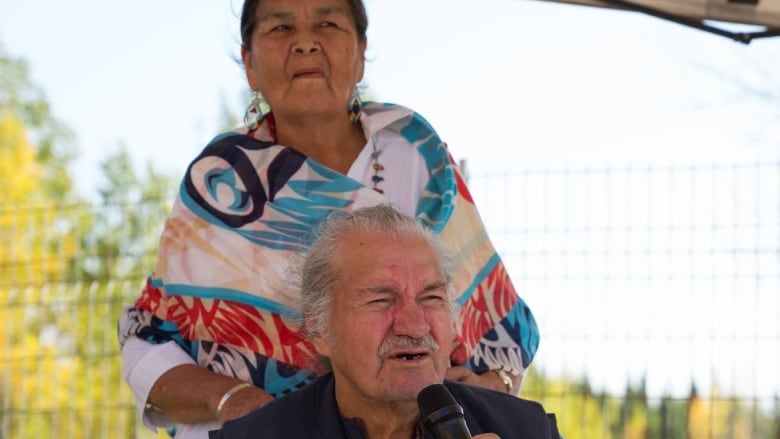Cree Nation mourns loss of Abel Kitchen, 'a remarkable man'
Abel Kitchen was a man that had 'courage to take on a path that is seldom travelled'

It's hard to overestimate Abel Kitchen's impact on the creation and progress of the modern Cree Nation in Quebec.
Although not in the spotlight, he was a key negotiator and signatory of the James Bay and Northern Quebec Agreement (JBNQA) — a land claims agreement signed in 1975. He was the first chairman of the Cree Regional Authority — what would later become the Cree Nation Government.
Kitchen was a local chief of his community of Waswanipi, Que., a mentor, and the executive director of the Cree Board of Health and Social Services of James Bay for a time. In his later years, Kitchen was an important cultural advisor involved with integrating traditional teachings and practices into all departments within the Cree Health Board.
I looked up to him. I admired his love for his people and culture.- Darren Saganash
Kitchen died earlier this month and the Cree Nation continues to mourn his loss.
"When it mattered, when the governments were trying to take away our lands and rights, he made a sacrifice in what he was trying to pursue in his personal life and goals, to stand with those to fight for Cree rights," said current Quebec Cree Grand Chief Abel Bosum, about Kitchen's role in the battle with Quebec over plans to build the massive James Bay hydroelectric project in the early 1970s. After four years of negotiations, court cases and bargaining, the JBNQA was signed.
"When I reminisce about those young people, [without them] we wouldn't be where we are today," said Bosum.

The Grand Council of the Crees issued a statement about his passing, saying the "Cree Nation owes an enormous debt of gratitude" to Kitchen and other young Cree who fought so hard in the 1970s.
"They were courageous, they were fearless, they were wise beyond their years and they were determined," it says in the statement.
"They were also deeply grounded in our Cree culture and values."
Kitchen shared words of wisdom over tea
Kitchen was also an important mentor to many in Eeyou Istchee, including to Romeo Saganash, the NDP MP in northern Quebec. Saganash posted on social media about the profound influence Kitchen had on him as a young man.
"It was back in the early 1980s, over some Labrador tea, that he shared with me his understanding of the principle of 'standing up for your rights.' I've been guided by that conversation since then," Saganash wrote on Feb. 7, as he was heading back to Parliament for the second reading of his private members bill to harmonize Canadian laws with the United Nations Declaration on the Rights of Indigenous Peoples.
"So it is both a cruel and kind irony for me this evening; saddened by such a loss, and thrilled that we will be voting on the result of [Kitchen's] teachings," wrote Saganash.

After decades in administrative leadership, Kitchen, who had a Bachelor of Arts in social work, turned his energies to preserving Cree cultural practices and traditions. He and his wife Jane both served on the the Council of Chishaayiyuu, a group of elders who advise the Cree Health Board in cultural matters.
In 2013, Kitchen was instrumental in the creation of the Nishiiyuu group — a major department focused on integrating traditional practices into all aspects of the Cree Health Board. Kitchen was then called "grandfather of Nishiiyuu."
"We acknowledge him because of his dedication and his courage to take on a path that is seldom travelled," said Laura Bearskin, assistant executive director of Nishiiyuu.
"He was a remarkable man."

The Cree Health Board posted a tribute to Kitchen on its website last week, calling him a "traditional healer, spiritual advisor, and mentor to many."
Kitchen and his wife were also key advisors in the creation of the Cree Nation's first women's shelter, Piipiichaau Uchishtuun (Robin's Nest), which opened last fall in Waswanipi.
"He was a good friend. [I] always took the time to stop and talk to Abel whenever we crossed paths," wrote Darren Saganash on social media, a fellow Waswanipi resident, who said the two talked about ceremonies, hunting and "the old days."
"I looked up to him. I admired his love for his people and culture."